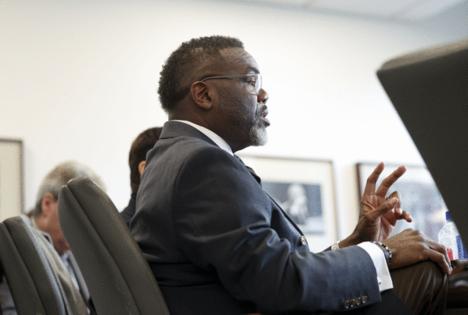Chicago Mayor Brandon Johnson blames past administrations after rating agency's negative budget outlook
Published in News & Features
CHICAGO — Mayor Brandon Johnson defended his 2026 budget proposal Thursday following a rating agency lowering its outlook on the city this week, which signaled a potential future credit downgrade to one notch above junk status.
And he addressed budget cuts he wants to make in 2026 at Chicago libraries, which have drawn criticism.
Speaking to reporters at City Hall, the mayor responded to S&P Global Ratings dropping Chicago from stable to negative the previous day by arguing his $16.6 billion spending plan for next year is in fact “very sound” despite scaling back an advance pension payment. S&P already knocked Chicago down to two notches about junk status in January following the mayor’s 2025 budget.
“I know that there have been questions around pensions, and when the executive order was put into place under the previous administration, it was set up to provide an additional advance payment based upon an assigned balance,” Johnson said, referring to former Mayor Lori Lightfoot’s directive on her way out of office. “Well, we no longer have that. However, we still were able to, even in these very difficult, tumultuous times, still put forth an advanced payment while not cutting services.”
On her way out the door in 2023, Lightfoot signed an executive order requiring the city to establish a “pension advance fund” using budget surpluses to help the pension funds tread water, telling Johnson not to “screw it up.”
But Johnson’s plan more than halves the city’s planned advance pension payment next year, from $271.8 million to $120.2 million. Though Lightfoot’s executive order does not legally bind Johnson today, his own finance team has insisted on making the extra payments because that would save billions down the line.
The move also won praise from ratings agencies like S&P, which help determine how much taxpayers owe in interest costs when Chicago borrows money.
However, Lightfoot was only able to earmark past extra pension payments thanks to American Rescue Plan Act dollars that padded the rest of the budget. Chicago’s “unassigned” fund balance, a flexible pot of money the city can draw from in emergencies, was zeroed out in 2024.
That balance has not dipped that low even during the depths of the 2008 recession, when it held just $226,000, according to the city’s annual financial reports.
Johnson on Thursday insisted that his budget plan provides a structural fix to the city’s longstanding fiscal issues where past administrations have failed. Though he didn’t offer specifics, Johnson said that “for a very long time, we have embraced this mediocre, I think, approach towards how we solve these challenges.”
He repeated that his proposal provides 65% structural remedies to the deficit, though his budget director Annette Guzman has said the ratio is in fact 60-40, down from the 2025 budget’s makeup of 68-32.
“Well, look, whether it’s 60% or 65%, the point is, it is overwhelmingly a structurally sound budget. That’s the most important thing,” Johnson said before spinning the question to why aldermen should support his $21-per-employee tax on corporations. “If you’ve never been in a position to have to choose whether or not you’re going to have lunch for your children or rent, then you may not ever fully understand the impetus behind this budget.”
However, the mayor’s budget plan assumes the passage of his head tax — far from guaranteed — and still does not fulfill the entire supplement payment. Instead, the $100 million in projected revenue would go toward replacing expiring ARPA funding for community violence intervention programs and other public safety initiatives, which the mayor said is a worthy price to pay for the “ultra-rich.”
Should S&P make good on its warning about another Chicago downgrade following the 2026 budget vote, it would be the first time that rating agency has placed the city one notch above junk rating in at least 20 years. Another agency, Fitch Ratings, downgraded the city in 2016 to one notch above junk status, where it remained until 2022.
Also on Thursday, the mayor addressed pressure he’s getting from his progressive allies and one of the city’s biggest labor organizations to restore cuts he wants to make next year to the public library system.
Under Johnson’s 2026 plan, 89 vacant positions at the Chicago Public Library and 50% of the collections fund used to buy books would be slashed. The American Federation of State, County and Municipal Employees (AFSCME) Local 1215, which represents frontline library workers, held a City Hall news conference on Tuesday condemning the moves.
“We need alders to not just say they support libraries, but to stand up and vote for the revenue needed to fund us,” library clerk Fernando Contreras said on Tuesday. “Now more than ever, we can’t continue to accept cuts of programs and services our residents rely on. I can’t tell you how many people have come to my branch to print out their immigration forms or materials for work.”
Johnson, for his part, responded two days later by nodding to the record $1 billion sweep of tax increment financing funds, some of which would go to the libraries.
“In this budget, there are no layoffs, there are no furloughs, there’s no reduction of services or hours,” the mayor said, sidestepping the question on whether he’d restore the CPL cuts. “We’re going to continue to find ways in which we can address all of the needs. But I want to make this absolutely clear that I put forth a budget that ensures that there’s no reduction, no loss of jobs and furloughs, no reduction of hours, even Sundays, to ensure that people continue to have access to our libraries.”
____
©2025 Chicago Tribune. Visit at chicagotribune.com. Distributed by Tribune Content Agency, LLC.







Comments